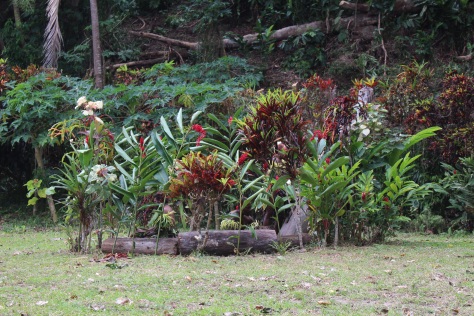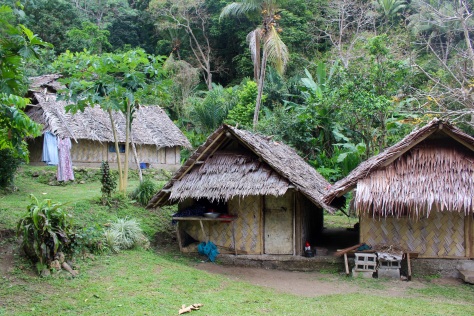Next morning brought the arrival of Chapter Two, Blue Wind and Maggie. Six BPO boats together — almost the entire fleet! Luc had arranged for a “festival” at the nearby village of Labo. The activities began with traditional dancing, as done in this area only. It had none of the masculine warrior spirit of the Marquesas or the sensuality of Tahiti or the grace of Tuvalu. In fact, its most distinguishing characteristic seemed to be that it was…different! Five ornately dressed/decorated men with…well, see the photos…snaking their way up from the beach, around the drummers in a field, and back from whence they came. They then did two more dances, where the only difference appeared to be the things that they carried. It did not make me want to get up and move my body, but it certainly was unique.
On to the fire-making demonstration. I had never actually seen someone start a fire without a match/lighter/spark. They did it by rubbing a hardwood stick against the inner wood of a coconut log. Something to file away for when I wash up empty-handed on an empty island. Or become a contestant on a TV “reality” show…
Next the feast. Almost all starch — taro, yams, sweet potato, mantioch, cassava — I don’t know all the variations, but there were all these and more. Some octopus, I think. No meat, and to my surprise no fish (even though we see lots of fishing going on around us). After we finished eating they showed us how some of the food was prepared. Much of it is rolled in leaves and stuffed into a length of green bamboo. The bamboo is then placed in the fire until it is charred, and then the food inside is done.
On to the tour of the village. About 150 people live there. I was once again impressed with the beauty and the cleanliness. It had falas/huts at the places with the best views, that were communal resting places. There were several water faucets, piped from a big tank up the hill. Some houses had water carried by bamboo sluices, directly from a stream. There were a few solar panels, but not many. I was told that everyone eats together in the dining hall, at least one meal per day, and sometimes three. The kids all look healthy and happy.
We followed a path up a hill, and then down to the local swimming hole. A stone dam had been built below a small waterfall to make a pool. Bob and I jumped in, along with several others.
There was a demonstration of pottery making. It seems that making pots had become a lost art, and one man was re-introducing the craft. And there was a group of women making “water music.” This is a challenge to describe. They use their hands in the water to make sounds like drumming, and by different motions they can make different sounds. It’s fun to watch and the sound is amazing. I have video, but the sound picked up by the video just isn’t the same as what you hear…
For all this we paid about $30 each, lunch included. A great value, as the village clearly spent days preparing for our visit. I have mixed feelings about the prepared presentation of the culture. It’s not that it isn’t real — it is. But it seems like it is taking the culture out of its natural context. I suppose it is like a “living museum.” Of course we would never have the opportunity to see and learn so much in one day, if it were not prepared/presented for us. And it is great that our money goes directly to the village, with no “agent” taking a cut. But I’m very glad that I got to see the village of Tisvel the other day, just as a friendly visit and not as a customer!






































Thank you for the combination of pictures and stories of your time in these communities. I too would be interested in how the narrative would be affected if you had the opportunity to stay for an extended period. I think it marvelous the community or shared space occupies the more scenic location. I also wonder about the source or supply of clothing. Obviously the day to day clothes are sourced elsewhere. Is it all donated? Is there any commerce between the villages? or beyond? What is the currency you used to pay the $30?
LikeLike
Clothing: I don’t know how the ‘western’ clothing ends up here. In Tonga I bought two very nice shirts for the equivalent of $5 US each, from a vendor on the street, clothes hung from a tree branch. Are they seconds, or last year’s style, or shipments never fulfilled that then go to a less demanding market…? I don’t know, and probably the vendors don’t know either.
Cash: There is little trade between villages, but there are cash crops. The primary one is copra (dried coconut meat, to be pressed for oil), plus some cacao. The copra boat will come periodically and buy what the village has ready. This is the primary direct source of cash. Another source is young people getting jobs in town, or in New Zealand or Australia, and sending money home. Vanuatu has its own currency – the Vatu (100 Vatu is close to $1 US). Tuvalu uses Australian currency. Niue is closely associated with NZ and uses their currency. The French islands use a French Polynesian franc, even though France of course uses the Euro.
LikeLike
how cute are those kiddo’s?
LikeLike
Wow Zeke! this was so ‘national geographic’! i love your post and hearing about this experience and the contrast from your time on Tisvel and Labo. Back in the 70’s in college i wrote a final paper to get my dance degree on Tongan Dance… this would’ve been an amazing place to see and document! The photos are fantastic and classics for sure. I’m jealous of what you’ve seen/done there. And yes, having traveled these past couple of winters, I understand the curiousity of what changes when you stay somewhere more than a short time… and drop more deeply into the authentic culture and ways of being. So fascinating! thanks for the great report! xo V
LikeLike
Amazing photos. The way I Iive is so far removed from these islands. I am almost without words…. and to think that you got there on your boat all the way from Key West. Very, very cool. I am trying to keep track of the cast… are Luc and Doina on the boat Drina – and it sounds like they have been to many of these places before, correct? It is also sobering to take responsibility for being a white US-er and the impact of the industrialized west on these island nations.
LikeLike
To clarify: Luc is our BPO rep in Vanuatu, and several other places. He is not on a BPO boat, though he lives on a boat and has cruised the Pacific for decades. Doina is Jimmy Cornell’s daughter, joining us only briefly with her son Dan, 13, on summer holiday. Drina is the boat they are on, which successfully went through the Northwest Passage last year (and which has also been around Cape Horn) — but Drina is headed home to Brisbane (and then for Cape Horn once again!), not continuing with the BPO.
About being from the USA, our taxi driver here (back in Santo) yesterday pointed out what a good road we were traveling on, and said that the US built the road for the island. That was nice to hear. There has not (yet) been a single time that I have felt unwelcome as a US citizen. I realize this is different from what you/Meg were saying about leading the industrialized world, but that industrialization is not stoppable, and what we can try to do IMO is be responsible about the planet and compassionate about the people who don’t currently wield much power.
LikeLike
Thank you so much for sharing your amazing adventures and fabulous pictures! What an incredible experience!
LikeLike